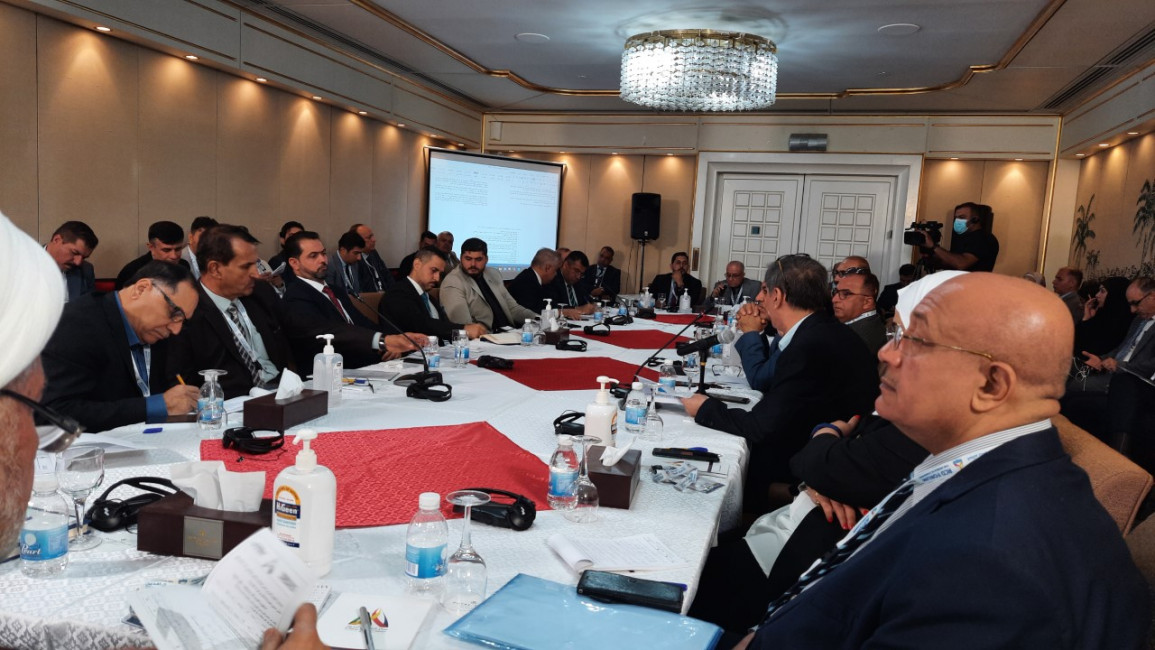Iraq urged to cooperate with global institutions in combating corruption
Iraq needs to enact firm measures locally and cooperate with international bodies to be able to limit systematic corruption often carried out under the hegemony of powerful political parties, and militias, Iraqi and international experts recommended during a recent forum held in the Iraqi capital city of Baghdad.
Al-Rafidain Center for Dialogue (RCD), an Iraqi think tank that encourages political, cultural and economic dialogues among all elites, held its fourth annual forum under the motto, "The World is changing" from 26 to 29 September in the Royal Tulip al-Rasheed Hotel, inside Baghdad's fortified Green Zone.
Many think tanks from Iraq, the Middle East, and elsewhere attended the event.
In "The System of Corruption: Deep Rooted Disease and Timid Solutions" workshop, attendees discussed the legal, political and social factors behind widespread corruption in Iraq, and ways to deal with it. Scholars also highlighted that before Iraq brings more international investments into the country, it must step up ways to eradicate corruption.
"Dealing with corruption is complicated, but I think the Iraqis should reach out to international institutions and governments to cooperate more," Peter Charles Choharis, from the Washington DC-based Choharis Law firm, told The New Arab after the workshop.
"It is not enough simply to investigate inside Iraq, you have to prove and show foreign investors that you are working alongside investors from the UK, the US, Asia, and the Gulf, to say that we are cooperating with your conferring if there is some hint of a problem with corruption," he added.
In terms of how the Iraqi government can extradite smuggled public monies into Iraq, Choharis said that money laundering and tax evasion, and bribery "all go together", stressing that money-laundry laws need to be updated.
According to Transparency International's 2021 corruption perceptions index, Iraq had a score of 23 out of 100 points, i.e. the country is among the most corrupt countries in the world. Iraqi law experts who addressed the workshop stressed that corruption in the country results from the ruling political elites and the weakness of the Iraqi judiciary, as well as the integrity commission's ability to bring corrupt people to justice.
"Always when we observe the three main authorities of legislative, executive, and judiciary in Iraq, there is a notion that wants to show the Iraqi judiciary as being politicised, the judiciary in Iraq is working based on the existence of an issue, reporting it, raising a complaint, presenting investigations and documents to the courts, and then finally a judgment," said Saed Yassin Musa, an Iraqi civil activist moderating the workshop. "I think the allegations that the Iraqi judiciary is politicised are accusations for the sake of confiscating public institutions and interests by paralysing the judiciary."
Musa acknowledged the existence of "political corruption" in Iraq that consequently generates useless laws and appoints unqualified individuals to public posts, exploits public funds, and misuses public resources.
Regarding the recent audio leaks by Iraqi journalist Ali Fadhil that exposed many corruption cases, Musa emphasised that the content of the leaks should be investigated by state institutions and inaction would only garner more discontent from the public.


![Minnesota Tim Walz is working to court Muslim voters. [Getty]](/sites/default/files/styles/image_684x385/public/2169747529.jpeg?h=a5f2f23a&itok=b63Wif2V)




![Debris near Rafic Hariri International Airport [Getty]](/sites/default/files/styles/image_330x185/public/2176162423.jpeg?h=a5f2f23a&itok=MCSK9mkM)
![An Israeli air strike on Jabalia killed teenage journalist Hassan Hamad [Screengrab/X]](/sites/default/files/styles/image_330x185/public/2024-10/hassan%20hamad1.jpg?h=c12e0b96&itok=Rd_dyCVp)
